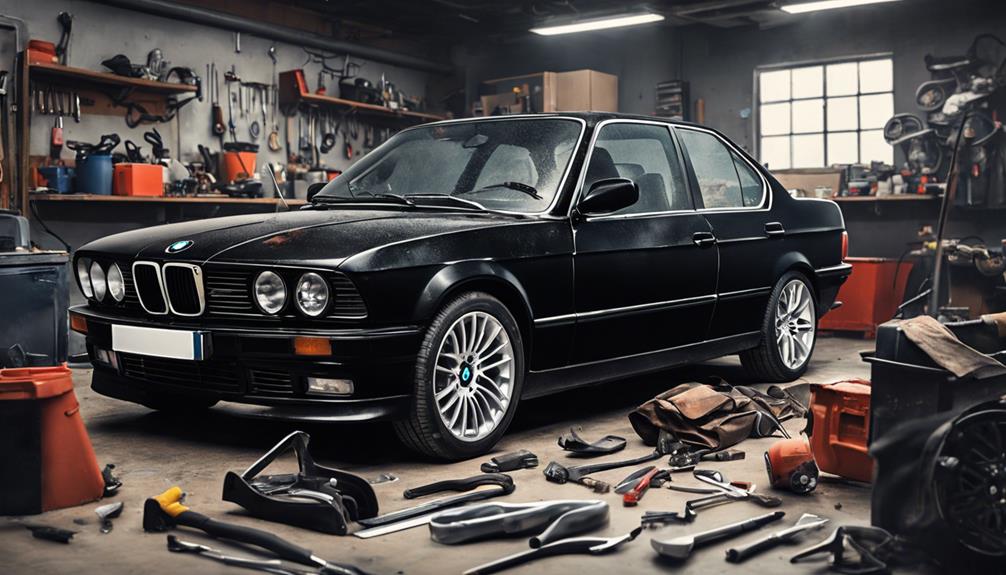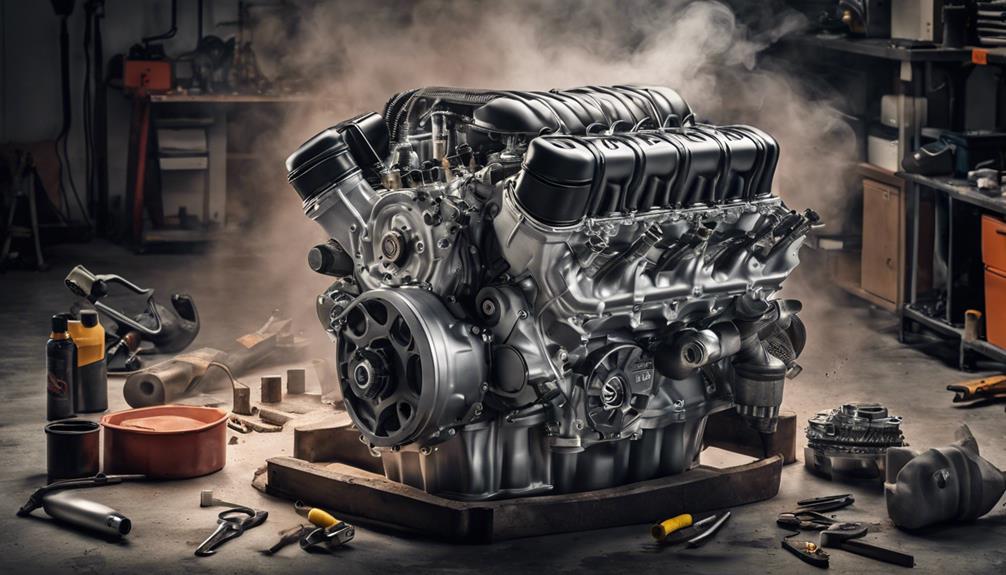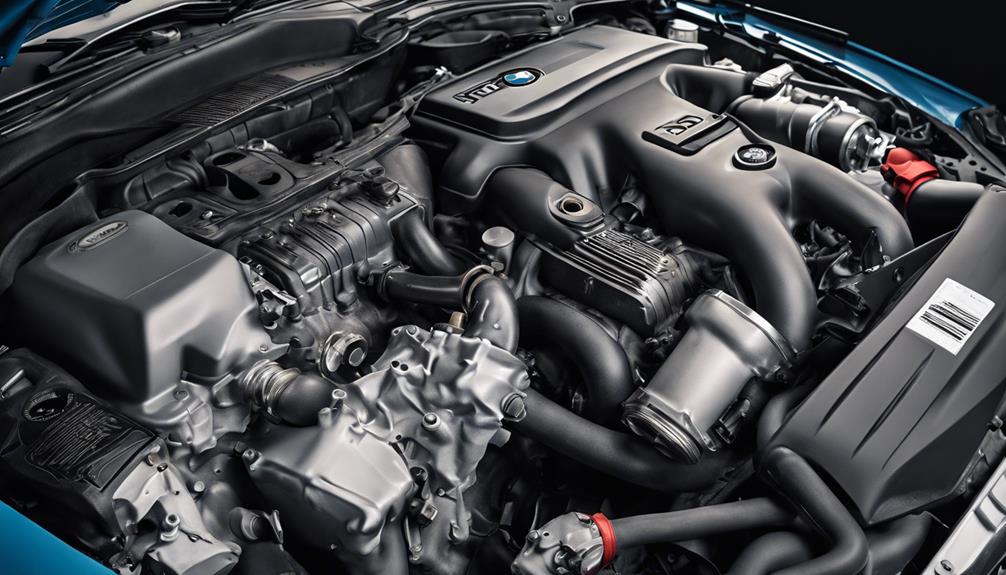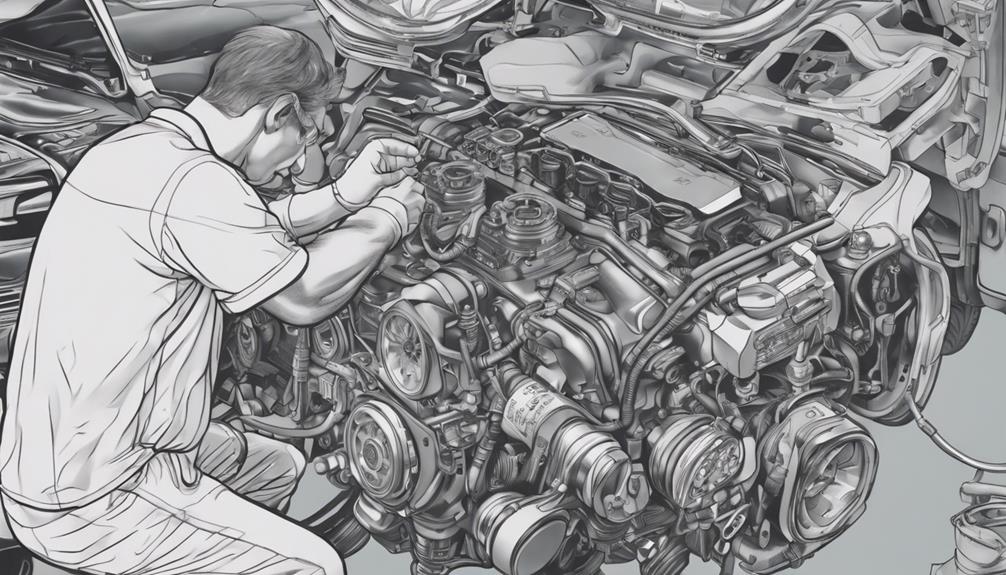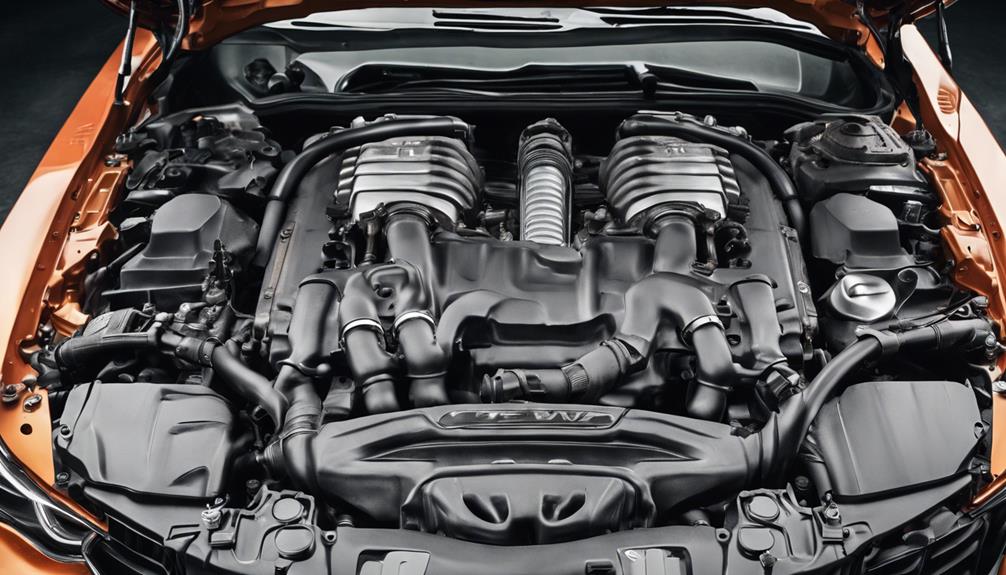Buying a pre-owned BMW can be a intricate decision, requiring careful consideration of potential maintenance costs, common repair issues, and the impact on overall car value. With a thorough maintenance approach, you can navigate through the engineering flaws in older models and guarantee the longevity of your BMW. While challenges like higher ongoing maintenance costs exist, investing in an older BMW could lead to appreciation potential and a unique driving experience. Remember, knowing the precautions when purchasing a used BMW is essential for making a well-informed choice.
Key Takeaways
- Used BMWs can be a good deal due to rapid depreciation rates.
- Regular maintenance is vital to avoid high repair costs.
- Older models may have engineering flaws requiring careful maintenance.
- Ownership challenges exist, but well-maintained BMWs can appreciate.
- Precautionary inspections can help mitigate potential issues.
Potential Maintenance Costs
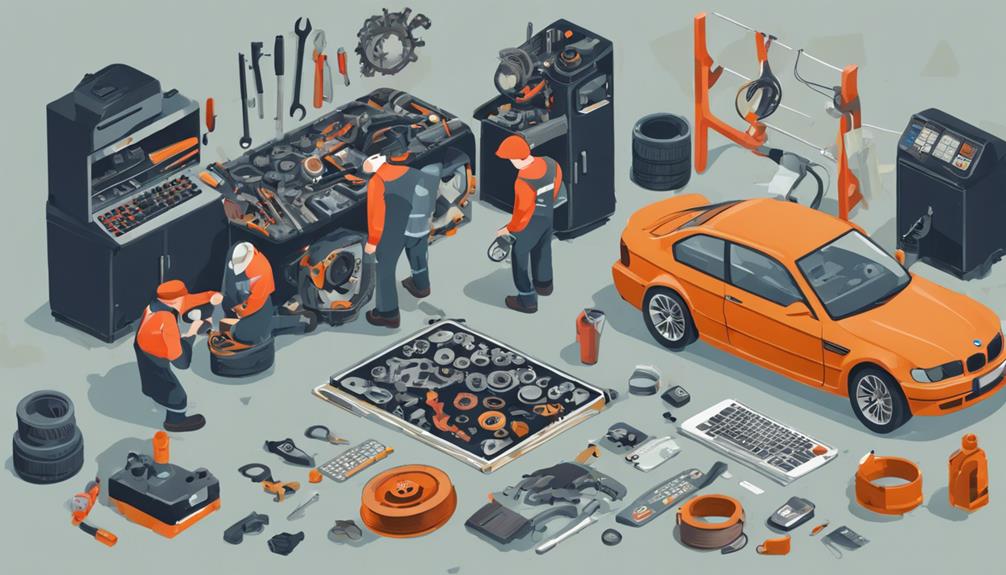
When considering the purchase of a pre-owned BMW, be prepared for potential maintenance costs that can exceed those of other vehicle brands due to the necessity of high-end parts and specialized services. Pre-owned BMWs might lure you in with their sleek designs and powerful engines, but lurking beneath the hood are potential expenses waiting to pounce. Maintenance costs for these luxury vehicles can sometimes feel like a never-ending saga, especially when it comes to issues like coolant leaks and intricate engine repairs.
The sophisticated engineering of BMWs demands precision and expertise, which often translates to higher service bills. Keeping up with regular maintenance isn't just a suggestion but a financial necessity to avoid costly surprises down the road. Engine-related problems can quickly escalate into wallet-draining nightmares if left unchecked, making it essential to address any issues promptly.
In the world of pre-owned BMWs, staying ahead of maintenance costs is like playing a strategic game where foresight and proactive care can save you from budgetary woes.
Common Repair Issues
You're ready to uncover the gritty truth about owning a used BMW. From engine cooling system failures to electronic glitches, these luxury vehicles come with a laundry list of common repair issues.
Buckle up as we navigate through the world of maintenance costs and reliability concerns that often plague BMW owners.
Maintenance Costs
Ensuring proper maintenance is crucial for used BMWs to avoid costly repair issues such as engine cooling system failures, oil leaks, and electronic system malfunctions. Engine cooling system failures can result in overheating and potential engine damage, while oil leaks can persist and require prompt attention to prevent more severe problems.
Electronic system malfunctions, such as sensor or infotainment system issues, can be expensive to diagnose and fix. These repair expenses are typically higher for BMWs because of the complex features and components that require specialized expertise and tools.
It's vital to remain proactive with regular maintenance to detect these issues early and keep your used BMW operating smoothly without incurring unexpected repair expenses.
Reliability Concerns
To steer clear of potential reliability concerns in used BMWs, it's imperative to be aware of common repair issues that may arise. Engine cooling system problems, like water pump issues and coolant leaks, are frequent culprits demanding attention. Fuel pump and injector issues, alongside oil leaks, are areas where used BMWs often require maintenance.
Additionally, the intricacies of BMW's electronic systems can lead to malfunctions, necessitating costly repairs over time. Addressing these common repair issues promptly through regular maintenance is key to ensuring the long-term reliability of your used BMW.
Engineering Flaws in Older Models

When exploring the domain of older BMW models, one can't overlook the prevailing engineering flaws that stem from the utilization of plastics and cost-cutting measures. These design choices have led to a myriad of issues, particularly in the engine department.
Models like the N54 and S85 are known for wastegate failures, coolant leaks, and excessive oil consumption, which can be quite the headache for owners. Additionally, specific engines like the N20 and N63 have been plagued with problems such as timing chain failures and high oil consumption rates, adding to the list of concerns.
Valve cover gaskets are another weak point in older BMWs, often failing prematurely and causing oil leaks. These complexities, combined with intricate wiring and sophisticated electronic systems, contribute to a higher likelihood of technical malfunctions in aging BMWs.
It's important to be aware of these engineering flaws when considering purchasing a used BMW to avoid potential costly repairs down the road.
Impact on Overall Car Value
When considering the impact on overall car value, it's important to weigh the resale value concerns associated with buying a used BMW.
Comparing depreciation rates against other brands will give you a clearer picture of the potential financial implications.
Analyzing maintenance costs can also provide insight into the long-term value of owning a used BMW.
Resale Value Concerns
Considering the rapid depreciation luxury brands like BMW experience, their resale value can be a major concern for potential buyers. When it comes to resale value concerns for a used BMW, here are some key points to keep in mind:
- Luxury brands like BMW depreciate faster than economy brands, impacting their resale value considerably.
- The constant release of newer models due to leasing practices can lead to lower resale values for older BMWs.
- High maintenance costs associated with luxury vehicles can further decrease their resale value over time.
- Purchasing a used BMW can save you 30–40% compared to buying new, highlighting the significant depreciation rate of these luxury cars.
Opting for a used BMW can still be a wise financial decision despite potential resale worries.
Depreciation Rate Comparison
To understand the impact of depreciation rates on the overall value of a BMW, it's essential to explore how these luxury vehicles lose value substantially over time.
BMWs, being luxury cars, have a higher depreciation rate compared to economy brands, typically shedding around 30-40% of their value when sold as used vehicles. This rapid depreciation is influenced by leasing practices and the constant upgrades to newer BMW models.
Additionally, the high maintenance costs associated with luxury cars like BMW play a significant role in their lower resale value. Opting for a used BMW can be a wise financial move due to the initial depreciation luxury vehicles experience.
Understanding the depreciation rate of BMWs is pivotal in evaluating the overall cost and value of owning one.
Maintenance Cost Analysis
Maintenance costs for older BMWs can greatly impact the overall value of the car, particularly with service shops charging high hourly rates for repairs. When contemplating a used BMW, it's crucial to examine the potential maintenance expenses to avoid surprises down the road.
Here are some key points to keep in mind:
- BMW vehicles are often retired within 4 to 8 years due to the high costs of upkeep.
- Common issues like coolant leaks, oil leaks, and electrical faults can escalate maintenance costs.
- Repairing BMW engines can be more expensive compared to other car brands, affecting the car's long-term value.
- Service shops charge high hourly rates for BMW repairs, contributing to maintenance expenses.
Being mindful of these factors can help you make an informed decision when purchasing a used BMW.
Ongoing Maintenance Needs
Given the nature of owning a used BMW, one must be prepared for the higher ongoing maintenance costs that come with it. These luxury vehicles, especially older models with a six-cylinder engine, often require meticulous care and precision. One common issue owners face is the oil filter housing gasket failure, leading to leaks and potential engine damage if not promptly addressed. Additionally, some BMWs are known for excessive oil consumption, necessitating more frequent oil top-ups with premium gasoline to maintain peak performance. To give you a clearer picture of the potential ongoing maintenance needs, here is a breakdown:
| Maintenance Needs | Description | Cost |
|---|---|---|
| Oil Filter Housing Gasket Replacement | Common issue leading to leaks | $400 – $800 |
| Excessive Oil Consumption Fix | Addressing high oil usage | $200 – $600 |
| Premium Gasoline Requirement | Ensuring proper fuel quality | Varies |
Understanding and budgeting for these ongoing maintenance needs will help you navigate the intricacies of owning a used BMW.
Resale Value Considerations
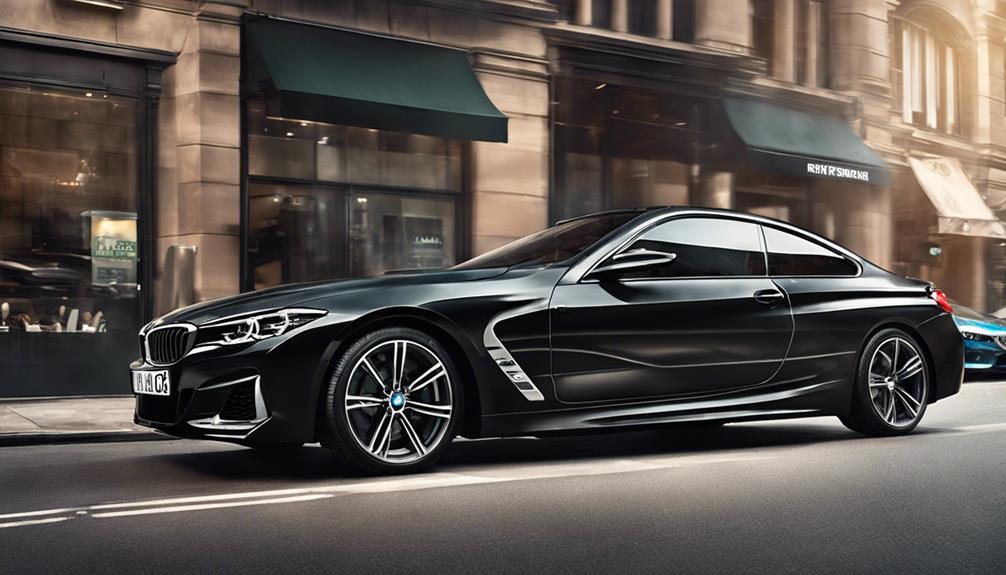
When considering the resale value of a used BMW, it's crucial to understand the impact of depreciation and maintenance costs on your investment. Luxury brands like BMW depreciate more rapidly than general economy brands, which can greatly affect their resale value. Companies and individuals frequently lease BMWs and upgrade to newer models, further contributing to the lower resale value of these luxury vehicles. Additionally, the high maintenance costs associated with luxury cars like BMW can have a negative impact on their resale value over time.
- Luxury brands like BMW depreciate faster than economy brands.
- Leasing practices contribute to lower resale values for BMWs.
- High maintenance costs of luxury vehicles affect resale values.
- Purchasing a used BMW can save 30-40% compared to buying new due to depreciation.
Buying a used BMW can be a smart move to avoid initial depreciation and save money in the long run.
Reliability of Used BMWs
When evaluating the dependability of pre-owned BMWs, it's crucial to review the maintenance history, typical mechanical problems, and available warranty coverage options. Understanding how well the car has been maintained can offer you insights into potential future issues.
Keep an eye out for any recurring problems and explore warranty choices that can offer peace of mind as you navigate the road ahead.
BMWs Maintenance History
Traversing the maze of a pre-owned BMW's maintenance history reveals essential insights into the dependability of these iconic vehicles. Explore the routine servicing and care a used BMW has received to gauge its reliability accurately. Here are some vital points to ponder:
- Routine Servicing: Regular maintenance is key to a used BMW's longevity.
- Nearby Repair Shop: Having a trusted repair shop familiar with BMWs can make a significant difference.
- Materials and Mileage: Factors like materials and mileage play a role in a used BMW's reliability.
- Electronic Components: The condition of electronic components can greatly impact the overall reliability of a used BMW.
Understanding these aspects can help you make an informed decision about purchasing a used BMW.
Common Mechanical Issues
Exploring the domain of pre-owned BMWs reveals a landscape filled with typical mechanical issues that can greatly impact the dependability of these luxury vehicles. Common problems often include issues with the water pump, leading to engine cooling system failures, as well as coolant leaks.
Additionally, the CCV system and vacuum leaks are frequently reported in used BMWs, affecting their reliability. Oil leaks are another prevalent issue that many BMW owners encounter, along with challenges related to the fuel pump and injectors.
The intricate electronic systems in BMWs can also contribute to frequent mechanical problems in pre-owned vehicles. To guarantee the reliability of a used BMW, regular maintenance is essential in addressing these common mechanical issues promptly.
Warranty Coverage Options
Exploring the domain of warranty coverage options for pre-owned BMWs reveals an essential aspect of guaranteeing the reliability and protection of your investment in these high-end vehicles. When considering purchasing a used BMW, it's important to delve into the various warranty options available to safeguard yourself from unexpected expenses. Here are some key points to keep in mind:
- Used BMWs may not have original warranty coverage, but certified pre-owned (CPO) BMWs offer extended warranty options.
- CPO BMWs undergo rigorous inspections and come with additional warranty benefits for peace of mind.
- Third-party extended warranty companies also offer coverage options for used BMWs beyond the manufacturer's warranty.
- Understanding and researching warranty plans can help mitigate the risks associated with buying a used BMW.
Longevity of Used BMWs
When considering the longevity of used BMWs, it becomes evident that routine servicing and knowledgeable repair shops are essential factors in maintaining their reliability. BMWs are known for their performance and luxury, but to guarantee they go the distance, regular maintenance is key.
With a typical lifespan of around 130,000 kilometers before parts may need replacement, staying on top of servicing schedules is vital. Factors such as materials, mileage, and electronic components also impact a BMW's reliability.
To keep your BMW running smoothly for years to come, having a nearby repair shop familiar with BMW mechanics is paramount. These experts can diagnose issues accurately and provide specialized care, extending the longevity of your beloved BMW.
Ownership Challenges

Considering the intricacies of owning a used BMW, challenges arise that demand careful navigation and a proactive approach to maintenance. When delving into ownership challenges, it becomes evident that maintaining a used BMW can be a demanding task.
Here are some key points to keep in mind:
- High Maintenance Costs: BMW dealerships make more profit from services and parts, leading to higher maintenance expenses for owners.
- Ongoing Maintenance Needs: Design flaws in older BMW models often result in frequent part replacements and the need for continuous maintenance.
- Well-Documented Issues: Many BMWs have known problems such as engine leaks, timing chain issues, and electrical failures, adding to the ownership challenges.
- Complexity Leading to Repairs: The intricate design of BMW vehicles increases the likelihood of facing electrical problems and other maintenance issues, requiring a proactive stance towards upkeep.
Navigating these ownership challenges requires a keen eye for detail and a willingness to invest in the ongoing care of the vehicle.
Technical Malfunctions
Amidst the intricate electronic systems and delicate wiring of BMW vehicles lie a domain of technical malfunctions waiting to challenge even the most skilled owners. Common issues such as engine leaks, timing chain problems, electrical failures, and cooling system failures can plague older BMW models, causing headaches for unsuspecting buyers. The use of plastics and cost-cutting measures in these vehicles often leads to premature component failures, particularly in the cooling systems, making maintenance a significant affair.
Specific BMW engines like the N54, S85, N20, and N63 are notorious for problems such as wastegate issues, coolant leaks, and oil consumption, adding to the list of potential technical malfunctions. Electrical gremlins are also prevalent in older BMWs, contributing to part failures and system malfunctions. When considering purchasing a used BMW, it's essential to be aware of these technical malfunctions to avoid unexpected expenses and frustrations down the road.
Appreciation Potential

Among older BMW models, the appreciation potential is evident, with certain iconic vehicles experiencing a surge in trade values and market demand. When contemplating the investment aspect of purchasing a used BMW, it's crucial to take into consideration the appreciation potential these older models can offer. Here are some key points to ponder:
- Collectible Status: Older BMW models like the E30 M3, E46 M3, and E39 M5 have gained significant popularity among enthusiasts, leading to an increase in their trade values.
- Manual Transmission Value: Manual versions of BMW models are becoming more sought after, with enthusiasts willing to pay a premium for the engaging driving experience they offer.
- Collector's Items: Investing in well-maintained older BMW models can potentially yield financial returns as they continue to establish themselves as collector's items.
- Rarity Factor: The scarcity of high-speed four-door sedans in the market makes certain older BMWs a desirable choice for collectors, enhancing their appreciation potential as time goes on.
Taking these factors into account, purchasing a well-maintained older BMW couldn't only satisfy your desire for a stylish ride but also prove to be a wise investment in the long run.
Precautions When Buying
When considering the purchase of a pre-owned BMW, ensuring you take necessary precautions can help you make an informed decision and avoid potential pitfalls. Before finalizing the deal, conduct a meticulous inspection to check for water damage, rim cracks, and any underlying engine issues.
During the test drive, pay close attention to the car's important components, including the performance of key parts like timing chains, water pumps, fuel injectors, and rod bearings. It's essential to have a professional examine the vehicle's history thoroughly, looking for any past accidents that might impact its reliability.
Keep an eye out for common BMW problems such as engine cooling system issues, oil leaks, and electronic system malfunctions. Prioritizing preventative maintenance won't only protect the car's long-term value but also help you steer clear of unexpected expenses down the road. By taking these precautions, you can navigate the used BMW market with confidence and make a purchase you won't regret.
Frequently Asked Questions
Are Second Hand BMW Cars Reliable?
When considering second-hand BMW cars, you'll find reliability hinges on factors like maintenance history, mileage, and electronic components. Proper servicing and a trustworthy repair shop can make owning a used BMW a wise choice.
What Are the Disadvantages of Buying a Used Bmw?
When considering a used BMW, remember high maintenance costs, depreciation issues, and frequent repairs. Coolant leaks, oil leaks, and electrical faults can be common. Be cautious of costly service charges impacting ownership expenses.
How Long Can a Used BMW Last?
A used BMW can last approximately 130,000 kilometers with proper maintenance. Regular servicing and being mindful of potential repair costs are crucial. Find a dependable BMW mechanic nearby to guarantee longevity and make an informed decision.
What Is Bad Mileage for a Used Bmw?
Having over 100,000 miles is often seen as bad mileage for a used BMW. Higher mileage can mean more costly repairs. Mileage above 150,000 miles may spell trouble. Opt for 50,000–80,000 miles for less wear and tear.
Conclusion
Overall, buying a used BMW can be a risky decision due to potential maintenance costs, common repair issues, and engineering flaws in older models.
While there may be some appreciation potential, the ongoing maintenance needs, ownership challenges, and technical malfunctions can outweigh any benefits.
It's important to take precautions when buying a used BMW to avoid any potential headaches down the road.
Think twice before diving into this luxury brand.





